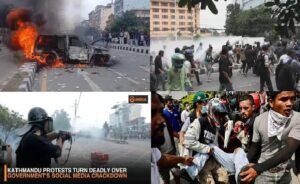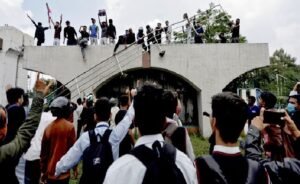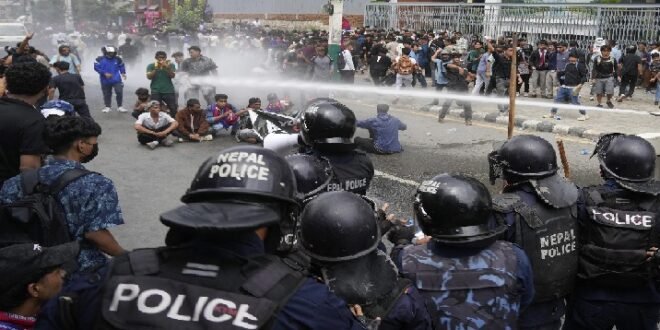08-09-2025
KATHMANDU: At least 14 people have been killed and dozens injured in Nepal after demonstrations against a government social media ban led to clashes between protesters and security forces.
Thousands heeded a call by demonstrators describing themselves as Generation Z to gather near the parliament building in Kathmandu over the decision to ban platforms including Facebook, X and YouTube.
 Nepal’s Minister for Communication Prithvi Subba told media police had to use force which included water cannons, batons and firing rubber bullets.
Nepal’s Minister for Communication Prithvi Subba told media police had to use force which included water cannons, batons and firing rubber bullets.
The government has said social media platforms need to be regulated to tackle fake news, hate speech and online fraud but popular platforms such as Instagram have millions of users in Nepal, who rely on them for entertainment, news and business.
Demonstrators carried placards with slogans including “enough is enough” and “end to corruption”.
Some said they were protesting against what they called the authoritarian attitude of the government.
As the rally moved into a restricted area close to parliament, some protesters climbed over the wall.
“Tear gas and water cannons were used after the protesters breached into the restricted area,” police spokesman Shekhar Khanal told media.
A Kathmandu district office spokesperson said a curfew was imposed around areas including the parliament building after protesters attempted to enter.
Nepal Army Spokesman Rajaram Basnet told media that a small unit of soldiers had been deployed in the streets following the introduction of the curfew.
Last week authorities ordered the blocking of 26 social media platforms for not complying with a deadline to register with Nepal’s ministry of communication and information technology.
Since Friday, users have experienced difficulty in accessing the platforms, though some are using VPNs to get around the ban. So far, two platforms have been reactivated after registering with the ministry following the ban.
 Nepal’s government has argued it is not banning social media but trying to bring them in line with Nepali law.
Nepal’s government has argued it is not banning social media but trying to bring them in line with Nepali law.
“We are protesting against corruption that has been institutionalized in Nepal.”
Another student, Ikshama Tumrok, 20, said she was protesting against the “authoritarian attitude” of the government.
“We want to see change. Others have endured this, but it has to end with our generation,” she told media.
Since the ban, videos contrasting the struggles of ordinary Nepalis with the children of politicians flaunting luxury goods and expensive vacations have gone viral on TikTok, which is still operating.
“There have been movements abroad against corruption and they (the government) are afraid that might happen here as well,” said protester Bhumika Bharati.
The cabinet decided last month to give the affected companies seven days to register in Nepal, establish a point of contact and designate a resident grievance handling officer and compliance officer.
The decision came after a Supreme Court order in September last year.
In a statement on Sunday, the government said it respected freedom of thought and expression and was committed to “creating an environment for their protection and unfettered use”. The government blocked access to the Telegram messaging app in July, citing a rise in online fraud and money laundering.
It lifted a nine-month ban on TikTok in August last year after the platform agreed to comply with Nepali regulations. (Int’l News Desk)
 Pressmediaofindia
Pressmediaofindia




